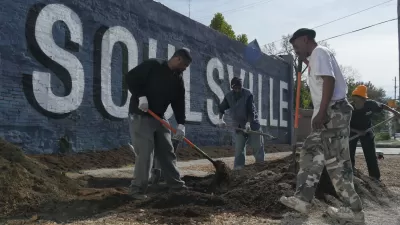Although crowdfunding initially developed to support artists and entrepreneurs, crowdfunding sites are funding a growing number of public space projects.
According to Brady Dale of Next City, since Kickstarter's unveiling in 2009, similar websites for crowdfunding have popped up that specifically focus on civic projects.
Civic technologist and Stanford University doctoral researcher Rodrigo Davies "published the first study of the use of crowdfunding for civic projects. One question he set out to answer was how crowdfunding could be a positive force in community development for communities at all income levels... His research found that 81 percent of civic projects initiated on Kickstarter reached their goals, making these projects more likely to succeed than projects that don’t serve some kind of public purpose. One in five crowdfunding projects across all platforms included in the study explicitly reference benefits for underserved communities."
Indeed, the most common civic project on such crowdfunding websites are open spaces and parks. Dale writes how former New York City Parks Commissioner and current senior vice president at the Trust for Public Land Adrian Benepe often saw, "large, multi-million-dollar projects sit unstarted for want of only thousands of dollars," which these crowdfunding methods can help remedy as either the first or last piece of the funding puzzle.
Benepe added that in his eyes, crowdfunding is a net positive, since "[r]ather than exacerbating inequality, private money enables a city to take public money and allocate it to neighborhoods that have no chance to do private fundraising."
FULL STORY: Crowdfunded Parks Are Coming and That Isn’t a Bad Thing

Alabama: Trump Terminates Settlements for Black Communities Harmed By Raw Sewage
Trump deemed the landmark civil rights agreement “illegal DEI and environmental justice policy.”

Planetizen Federal Action Tracker
A weekly monitor of how Trump’s orders and actions are impacting planners and planning in America.

Why Should We Subsidize Public Transportation?
Many public transit agencies face financial stress due to rising costs, declining fare revenue, and declining subsidies. Transit advocates must provide a strong business case for increasing public transit funding.

Understanding Road Diets
An explainer from Momentum highlights the advantages of reducing vehicle lanes in favor of more bike, transit, and pedestrian infrastructure.

New California Law Regulates Warehouse Pollution
A new law tightens building and emissions regulations for large distribution warehouses to mitigate air pollution and traffic in surrounding communities.

Phoenix Announces Opening Date for Light Rail Extension
The South Central extension will connect South Phoenix to downtown and other major hubs starting on June 7.
Urban Design for Planners 1: Software Tools
This six-course series explores essential urban design concepts using open source software and equips planners with the tools they need to participate fully in the urban design process.
Planning for Universal Design
Learn the tools for implementing Universal Design in planning regulations.
Caltrans
Smith Gee Studio
Institute for Housing and Urban Development Studies (IHS)
City of Grandview
Harvard GSD Executive Education
Toledo-Lucas County Plan Commissions
Salt Lake City
NYU Wagner Graduate School of Public Service




























